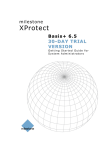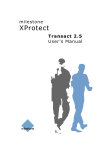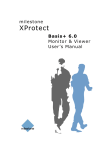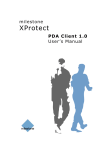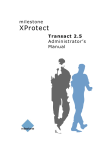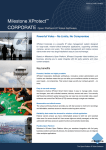Download Milestone XProtect Enterprise 7.0 30-DAY TRIAL
Transcript
Milestone XProtect™ Enterprise 7.0 30-DAY TRIAL VERSION Getting Started Guide for System Administrators Milestone XProtect Enterprise 7.0; 30-DAY TRIAL VERSION; Getting Started Guide Contents ABOUT THE TRIAL VERSION ....................................... 4 What is XProtect Enterprise? ................................................................ 4 System Requirements........................................................................... 4 Limitations in Trial Version ................................................................... 5 INSTALLATION ........................................................... 6 ADDING CAMERAS TO YOUR SYSTEM ......................... 7 Prerequisites ........................................................................................ 7 Wizards Help You Add Hardware Devices … ......................................... 8 … and Configure Cameras and Users .................................................... 8 ADVANCED CONFIGURATION OVERVIEW ................. 10 Cameras ............................................................................................. 10 Event and Output Configuration.......................................................... 11 Scheduling .......................................................................................... 11 Archiving ............................................................................................ 12 Client Access, Users and Rights .......................................................... 12 GETTING A CLIENT ................................................... 14 MASTER/SLAVE ........................................................ 15 UPGRADING TO A FULL VERSION ............................. 16 www.milestonesys.com Contents Milestone XProtect Enterprise 7.0; 30-DAY TRIAL VERSION; Getting Started Guide Copyright © 2010 Milestone Systems A/S. Trademarks XProtect is a registered trademark of Milestone Systems A/S. Microsoft and Windows are registered trademarks of Microsoft Corporation. All other trademarks mentioned in this document are trademarks of their respective owners. Disclaimer This document is intended for general information purposes only, and due care has been taken in its preparation. Any risk arising from the use of this information rests with the recipient, and nothing herein should be construed as constituting any kind of warranty. Milestone Systems A/S reserve the right to make adjustments without prior notification. All names of people and organizations used in this document’s examples are fictitious. Any resemblance to any actual organization or person, living or dead, is purely coincidental and unintended. XPE70-TRIAL-gsg-2-260510 www.milestonesys.com Contents Milestone XProtect Enterprise 7.0; 30-DAY TRIAL VERSION; Getting Started Guide About the Trial Version This guide is aimed at users of the Milestone XProtect Enterprise 30-day trial version only. It briefly explains how to install the XProtect Enterprise trial version, and how to configure some of its key features. For more detailed feature descriptions, refer to the manuals available on the Milestone Systems website, www.milestonesys.com. XProtect Enterprise furthermore features a very comprehensive built-in help system: When you have installed XProtect Enterprise, simply use the Management Application’s Help menu or pres F1 on your keyboard to access the help system. What is XProtect Enterprise? XProtect Enterprise is comprehensive open platform IP video management software designed for medium and large-scale multi-server, multi-site installations. Easy-to-use clients provide intuitive, fullyfeatured operator viewing and control of an unlimited number of connected cameras, servers, users and devices. With an open platform, you design the system to fit your needs and grow your installation incrementally with licensing per video channel and seamless upgrades. Easy to install and manage, XProtect Enterprise’s consolidated single-management interface provides a coherent overview of devices, recordings and user settings. Straightforward installation wizards, swift automatic device discovery, and the intuitive user interface make XProtect Enterprise easy to deploy. Configuration wizards and intuitive dynamic administration significantly reduces the time and costs of video surveillance management and provide maximum usability. System Requirements The following are minimum system requirements for the server running the XProtect Enterprise server software: Operating System Microsoft® Windows® XP Professional (32 bit or 64 bit*), Windows Server 2003 (32 bit or 64 bit*), Windows Server 2008 R1/R2 (32 bit or 64 bit*), Windows Vista™ Business (32 bit or 64 bit*), Windows Vista Enterprise (32 bit or 64 bit*), Windows Vista Ultimate (32 bit or 64 bit*), Windows 7 Professional (32 bit or 64 bit*), Windows 7 Enterprise (32 bit or 64 bit*) and Windows 7 Ultimate (32 bit or 64 bit*). * Running as a 32 bit service/application. www.milestonesys.com Page 4 About the Trial Version Milestone XProtect Enterprise 7.0; 30-DAY TRIAL VERSION; Getting Started Guide CPU Intel® Pentium® 4, 2.4 GHz or higher (CoreTM 2 recommended). RAM Minimum 1 GB (2 GB or more recommended). Network Ethernet (1 Gbit recommended). Graphics Adapter AGP or PCI-Express, minimum 1024×768, 16 bit colors. Hard Disk Type E-IDE, PATA, SATA, SCSI, SAS (7200 rpm or faster). Hard Disk Space Minimum 1 GB free hard disk space available, excluding space needed for recordings. Software Microsoft .NET 3.5 Framework Service Pack 1 or newer. DirectX 9.0 or newer required if wishing to run the Viewer application. Windows Help (WinHlp32.exe). Internet Information Server (IIS) 5.1 or newer required for running PDA Server. All are downloadable from http://www.microsoft.com/downloads/. System requirements for clients, etc. are available in the separate manuals describing these applications. You find the manuals on www.milestonesys.com. Limitations in Trial Version Compared with a full version of XProtect Enterprise, the trial version has the following limitations: ● The trial version is valid for 30 days only. After the 30-day trial period, you will not be able to use the trial version. You will, however, still be able to upgrade the trial version to a full version. ● You are able to view and record video from a maximum of four cameras at a time. A full version allows simultaneous viewing and recording from 64 cameras per server. Tip: Just like in a full version, you are allowed to add an unlimited number of cameras to your trial system, so you can easily test more than four cameras on your trial system—provided you only view live video from a maximum of four cameras at a time. ● The total amount of recordings you can store is limited to one day (24 hours), regardless whether the recordings are stored in XProtect Enterprise’s regular databases or in archives. A full version lets you keep recordings for as long as required, limited only by the available hardware storage capacity. ● No Device License Keys are required for the cameras and/or video encoders you add to your trial system. A full version requires a Device License Key (DLK) for each camera and/or video encoder you add. The Device License Keys allow you to run the cameras and/or video encoders with your full version. You get Device License Keys from your Milestone vendor or straight from www.milestonesys.com. Should you want to upgrade your trial version to a full version, you can easily do so at any time during or after the 30-day trial period. See Upgrading to a Full Version on page 16. www.milestonesys.com Page 5 About the Trial Version Milestone XProtect Enterprise 7.0; 30-DAY TRIAL VERSION; Getting Started Guide Installation Before installation, shut down any existing Milestone software. ● If you have a software DVD: Insert the XProtect Enterprise software DVD, wait for a short while, select required language, then click the XProtect Enterprise installation link. ● If you downloaded the software: Run the downloaded installation file from the location you have saved it to ● Depending on your security settings, you may receive one or more security warnings. When this is the case, click the Run button. ● When the installation wizard starts, click Next to continue. ● Read and accept the End User License Agreement, then click Next. ● Select Typical installation. ● Select the Install 30 days trial option, specify your user name and organization, and click Next. ● Click the Install button to begin the software installation. During the process, all the necessary components will be installed one after the other. ● Click Finish on the last step to complete the installation. The computer on which you performed the installation now works as an XProtect Enterprise server. A Smart Client for viewing live and recorded video is automatically installed on the XProtect Enterprise server. For descriptions of how to install XProtect Enterprise’s other associated applications, for example the XProtect PDA Client solution for viewing surveillance video on handheld devices, refer to XProtect Enterprise’s built-in help system or the manuals available on www.milestonesys.com. www.milestonesys.com Page 6 Installation Milestone XProtect Enterprise 7.0; 30-DAY TRIAL VERSION; Getting Started Guide Adding Cameras to Your System In XProtect Enterprise you technically do not add cameras; rather you add hardware devices. This is because hardware devices have their own IP addresses or hostnames on your network. XProtect Enterprise uses the IP addresses or hostnames to identify units on the surveillance system. In most cases, the camera and the hardware device is the same physical unit. There are, however, hardware devices to which you can connect several cameras. This is typically the case with video encoders (also known as video servers), which are used for connecting analog cameras to IP networks. You need to know the IP addresses or hostnames of the hardware devices you want to add to your trial system. Ask your network administrator if in doubt. You can of course configure and use each camera individually, even when several cameras are attached to a single hardware device and thus share the same IP address or hostname. Prerequisites Before adding a hardware device to XProtect Enterprise, make sure the hardware device is supported by XProtect Enterprise, and that its IP address or hostname, administrator password, etc. have been configured on the device itself as described by the manufacturer. ● To verify whether a hardware device is supported, look at Support > Questions & Answers > Supported Hardware on the Milestone website, www.milestonesys.com. ● Also make sure you have the latest XProtect device drivers. Device drivers are tiny pieces of software which make hardware devices work with Milestone XProtect systems. You automatically get a large collection of device drivers when you install XProtect Enterprise, but a newer collection—a so-called Device Pack—may be available: To see which Device Pack version you got during your XProtect Enterprise installation, go to Windows’ Start menu, and select Settings > Control Panel > Add or Remove Programs. On the list of currently installed programs, locate Video Device Pack and see which version number is listed after the name (e.g. Video Device Pack V4.7). Now go to the Milestone Systems website, www.milestonesys.com, and look at Support > Downloads to see if a later XProtect Device Pack version is available. If it is, make sure you download and install it on your XProtect Enterprise server. Tip: On www.milestonesys.com you can also find release notes for each device pack. The release notes contain useful information. For example, they will tell you if a special administrator account must be configured on the hardware device before you can add the hardware device to XProtect Enterprise (see also the next prerequisite). ● Finally, when you add a hardware device to your XProtect Enterprise system, you must in most cases specify the password for the hardware device’s administrator account. That account gives full access to the device, and XProtect Enterprise is going to need that. A hardware device’s administrator password is typically specified when you initially set up the hardware device on your network, using the hardware device’s own web page. Make sure you know the password for the administrator account of each hardware device you require on your trial system. Tip: Have you previously used a web page to connect to a camera on your network? While you did this, were you also able to configure the cameras’ settings (such as resolution, etc.)? If you www.milestonesys.com Page 7 Adding Cameras to Your System Milestone XProtect Enterprise 7.0; 30-DAY TRIAL VERSION; Getting Started Guide can answer yes to both questions, you were in all likelihood using the hardware device’s administrator account, in which case you will also know the password. Wizards Help You Add Hardware Devices … When you are ready, do the following to add devices to your XProtect Enterprise trial system: ● Open XProtect Enterprise’s Management Application, either from Windows’ Start menu or by double-clicking the Management Application shortcut on your desktop. ● In the Management Application, click the Add Hardware Devices… button. ● A wizard now offers you four ways of adding hardware devices: Express (recommended): Quickly scans your network for devices, and helps you quickly add them to your system. This method is quick and easy since it only scans for devices supporting device discovery, and only on the part of your network (subnet) where the XProtect Enterprise server itself is located. Device discovery is a method with which hardware devices make information about themselves available on the network. Based on such information, XProtect Enterprise can recognize relevant hardware devices on your network, and thus include cameras—but not printers and other irrelevant devices—in the scan. To use the Express method, your XProtect Enterprise server and your cameras must be on the same layer 2 network; that is a network where all servers, cameras, etc. can communicate without the need for a router. Advanced: Scans your network for hardware devices based on your specifications regarding required IP address ranges, discovery methods, drivers, and hardware device’s user names and passwords. Manual: Lets you specify details about each hardware device separately. A good choice if you only want to add a few hardware devices, and you know their IP addresses, required user names and passwords, etc. Import from CSV file: Lets you import data about cameras as comma-separated values from a file; an effective method if setting up several similar systems. Just like in a full version, you are allowed to add an unlimited number of cameras to your trial system, but remember that in the trial version you can only view and record video from a maximum of four cameras at a time. You can, however, easily test more than four cameras on your trial system—provided you only view live video from a maximum of four cameras at a time. … and Configure Cameras and Users When you have added cameras, use XProtect Enterprise’s other wizards to configure video and recording, adjust motion detection, and configure user access. Note that those wizards only cover a selection of frequently used functionality, not every configuration option. www.milestonesys.com Page 8 Adding Cameras to Your System Milestone XProtect Enterprise 7.0; 30-DAY TRIAL VERSION; Getting Started Guide For example, the Configure User Access wizard only lets you set up users with access to all cameras. This means that the users you add through the wizard will be able to view video from all cameras on your trial system (max. four at a time, since you can only view four cameras at a time in a trial version). This is ideal if your trial setup only involves a small number of trusted users, but if you want to specify different feature and camera rights for each user, you must use advanced configuration. On the following pages we will therefore take a quick look at some of the advanced configuration options. Advanced configuration of client access, users, and their rights is covered on page 12. www.milestonesys.com Page 9 Adding Cameras to Your System Milestone XProtect Enterprise 7.0; 30-DAY TRIAL VERSION; Getting Started Guide Advanced Configuration Overview Cameras Camera settings are configurable on a general and on a camera-specific level. On the general level, you can specify video, recording and shared settings (such as dynamic archiving paths and whether audio should be recorded or not) for all your cameras: 1. In the Management Application's navigation pane, expand Advanced Configuration, rightclick Cameras and Storage Information, and select Properties. 2. Specify properties for, for example, Recording & Archiving Paths, Frame Rate, or Audio Recording. When ready, click OK. 3. Save your configuration changes by clicking the Save Configuration button in the Management Application's toolbar. On the camera-specific level, you can configure video, recording and other features (such as event notification, PTZ preset positions, and fisheye view areas) for each individual camera. 1. In the Management Application's navigation pane, expand Advanced Configuration, and expand Cameras and Storage Information. 2. Right-click the required camera, and select Properties. 3. Specify properties as required for: ● Camera name ● Frame rate ● Video quality (such as format, resolution, compression, etc.) ● Audio (associated microphones and speakers) ● Recording (when and how) ● Recording & archiving paths (where to store recordings) ● Event notification (notify clients when specific events occur) ● Output (associate the camera with output like sirens, lights, gates, etc.) ● Motion Detection (a key element in XProtect Enterprise, as detected motion may be used for determining when to start recording, when to generate alerts, etc.) And, if applicable, ● Fisheye (for cameras delivering 360° panoramic images) ● Settings for PTZ (Pan/Tilt/Zoom) cameras (presets, patrolling, and PTZ on event); see also the following. 4. Save your configuration changes by clicking the Save Configuration button in the Management Application's toolbar. PTZ Cameras PTZ (Pan/Tilt/Zoom) cameras are supported extensively throughout XProtect Enterprise. Such cameras can be operated manually as well as automatically. www.milestonesys.com Page 10 Advanced Configuration Overview Milestone XProtect Enterprise 7.0; 30-DAY TRIAL VERSION; Getting Started Guide PTZ cameras have a navigation pane. symbol next to them when listed in the Management Application’s Analog PTZ cameras attached to video encoders can also be used. However, they require more initial configuration: In the Management Application’s navigation pane, expand Advanced Configuration, expand Hardware Devices, double-click the required video encoder device, and select PTZ device to set up the video encoder for use with PTZ cameras. Check the device pack release notes available on www.milestonesys.com to see exactly which PTZ features are supported for the hardware devices used on your trial system. Event and Output Configuration Hardware input events (based on input from, for example, door sensors attached to XProtect Enterprise’s hardware devices), manual events (triggered manually by users), generic events (based on analysis of received data packets) and timer events (occurring a specified number of seconds or minutes after another event) can be used for automatically starting/stopping recordings, creating alerts, etc. Hardware output can be used for activating external units, such as sirens, lights, gates, etc. Hardware output can be triggered automatically by events. The use of most hardware input events and all types of output requires that external sensors are wired to input/output (I/O) connectors on the hardware devices in question, and that I/O operation on the hardware devices is supported by XProtect Enterprise. Check the device pack release notes available on www.milestonesys.com to see if I/O operation is supported for the hardware devices used on your trial system. To configure events and output: In the Management Application’s navigation pane, expand Advanced Configuration, expand Events and Output, right-click the required type of event or output, and select Add New ... Once configured, events can be used with features throughout XProtect Enterprise, regardless of where sensors are physically connected. Scheduling XProtect Enterprise’s scheduling feature makes sure camera and alert activity is enabled in accordance with defined periods of time. With the system’s default settings, added cameras are automatically online at all times, and you will only need to modify scheduling settings if you require cameras to be online at specific times, on specific events, or if you want to enable certain alerts. To configure scheduling on a per-camera basis: In the Management Application’s navigation pane, expand www.milestonesys.com Page 11 Advanced Configuration Overview Milestone XProtect Enterprise 7.0; 30-DAY TRIAL VERSION; Getting Started Guide Advanced Configuration, expand Scheduling and Archiving, right-click the required camera, and select Properties ... Archiving Archiving is the automatic transfer of recordings from cameras’ databases on the XProtect Enterprise server to another location. This way, the amount of recordings you are able to store will not be limited by the maximum size of the databases. Archiving also makes it possible to secure your recordings on backup media of your choice. XProtect Enterprise automatically archives recordings if a camera's database becomes full (in earlier versions, this was an option configured individually for each camera). You are furthermore able to schedule archiving at particular points in time every day. This way, you can proactively archive recordings, so databases will never become full. In a full version, the archiving feature enables recordings to be kept for as long as required, limited only by the available hardware storage capacity. In the trial version, you are limited to keeping a total one day (24 hours) of recordings, regardless whether the recordings are stored in XProtect Enterprise’s regular databases or in archives. There are several ways in which to configure where to store archives. We highly recommend using dynamic paths for archives. With dynamic paths, you specify a number of different archiving paths, usually across several drives. If the path containing the relevant camera’s database is on one of the drives you have selected for archiving, XProtect Enterprise will always try to archive to that drive first. If not, XProtect Enterprise automatically archives to the archiving drive with the most available space at any time. This fact will have no impact on how users find and view archived recordings. Dynamic archiving paths are general for all your cameras. To configure dynamic archiving paths: In the Management Application’s navigation pane, expand Advanced Configuration, right-click Cameras and Storage Information, and select Properties ..., then Dynamic Path selection – Archives. Client Access, Users and Rights Users are able to connect to your XProtect Enterprise surveillance system with a number of different clients. Here, we will focus on the Smart Client, Milestone’s most feature-rich client (for details, see the Smart Client User’s Manual available on www.milestonesys.com). In the following, we will begin by configuring clients’ access to the surveillance system. When that is in place, we will define the actual users and their rights. ● In the Management Application’s navigation pane, expand Advanced Configuration, right-click Server Access, and select Properties ... ● In the Server Access section’s Server name field, type a descriptive name for your XProtect Enterprise server (users will identify the server by this name). If required, you can change the local port used for communication between users and the XProtect Enterprise server (default is port 80). ● If your XProtect Enterprise server should be accessible from the internet through a router or firewall, select Enable internet access and specify the server’s internet address and port. Note that the router/firewall must be configured so requests sent from clients to the internet address and port are forwarded to the local address and port of the XProtect Enterprise server. www.milestonesys.com Page 12 Advanced Configuration Overview Milestone XProtect Enterprise 7.0; 30-DAY TRIAL VERSION; Getting Started Guide ● IP address ranges which should be recognized as coming from the local network can be defined in the Local IP Ranges section. ● In the Language Support and XML Encoding section, select the language/character set used by the XProtect Enterprise server and clients. This will ensure that the right language and character encoding is used in users’ communication with the server. Now that clients’ access to the server is in place, we can define users and what those users are allowed to do: ● In the Management Application’s navigation pane, expand Advanced Configuration, right-click Users, and select either Add New basic User … or Add New Windows User … Basic Users are users authenticated by a simple user name and password combination; Windows Users are users authenticated by their Windows login, typically through Active Directory. ● When you have added a user, the User Properties window opens. There you can review the user’s general access settings, i.e. whether the user should be allowed to view live video, play back recorded video, configure the client through the clients Setup tab, etc. By default, the user has full rights, but you can limit those rights as required. When ready, select the window’s Camera Access section. ● In the Camera Access section, specify which cameras the user should have access to. For each camera you are also able to give the user access to viewing live and playing back recorded video, and to individual live and playback features. ● When ready, click OK, and add other users as required. As you add users, they get added to the list of users in your Management Application’s navigation pane. When you have added all required users, save your configuration by clicking the Save Configuration button in the Management Application's toolbar. www.milestonesys.com Page 13 Advanced Configuration Overview Milestone XProtect Enterprise 7.0; 30-DAY TRIAL VERSION; Getting Started Guide Getting a Client A Smart Client for viewing live and recorded video is automatically installed on the XProtect Enterprise server. If you require more Smart Clients, for yourself or for your organization’s users, you can easily download and install them from the XProtect Enterprise server: ● Open an Internet Explorer browser (version 6.0 or later), and connect to the IP address of the XProtect Enterprise server with the port number you specified when defining client access (see page 12). Example: If the server’s IP address is 123.123.123.123 and you use the default port number 80, connect to http://123.123.123.123:80. ● When you connect to the server, you will see a welcome page. On the welcome page, simply click the required link to get your client. Example of a Smart Client displaying live video from several cameras. Note that a trial version of Milestone XProtect Enterprise allows viewing of video from a maximum of four cameras. Alternative User Access Methods In this chapter, we have focused on access through the Smart Client. If you want to try out the somewhat less feature-rich Remote Client, your will work with Remote Clients as well. The only difference is that the Remote Client is run straight from the server, without any need for installation. Another alternative is the PDA Client for access through a PDA handheld device. In addition to the configuration described earlier, the PDA Client requires that a PDA Server, acting as a front-end to the XProtect Enterprise, is installed. For more information about these alternatives, refer to XProtect Enterprise’s built-in help system or the manuals available on www.milestonesys.com. www.milestonesys.com Page 14 Getting a Client Milestone XProtect Enterprise 7.0; 30-DAY TRIAL VERSION; Getting Started Guide Master/Slave Master/Slave is an advanced feature which adds to the flexibility of XProtect Enterprise: If required, you are able to install the XProtect Enterprise trial software on several servers, and create a master/slave setup of these servers. A master/slave setup will allow client users to transparently connect to more than one server simultaneously, as any number of servers can be defined as slave servers under a master server. When users connect to the master server, they will instantly get access to the slave servers as well. Master/slave is a feature targeted at larger installations, thus it is probably not relevant in a trial setup, but you can try it out if you want (provided you have more than one XProtect Enterprise server). You configure master/slave from the Management Application: In the Management Application’s navigation pane, expand Advanced Configuration and select Master/Slave. For detailed information, refer to XProtect Enterprise’s built-in help system or the manuals available on www.milestonesys.com. www.milestonesys.com Page 15 Master/Slave Milestone XProtect Enterprise 7.0; 30-DAY TRIAL VERSION; Getting Started Guide Upgrading to a Full Version If you want to upgrade your trial version to a full version, you can easily do so at any time during or after the 30-day trial period. When upgrading, you do not need to go through installation again. You can simply upgrade your existing trial version to a full version the following way: ● Purchase a license for a full version of XProtect Enterprise from your Milestone vendor. A list of vendors in all parts of the world is available on www.milestonesys.com. When you purchase a license for a full version, you will receive a Software License Code (SLC). You will use this SLC when upgrading. Your Milestone vendor may send you the SLC in an email. Alternatively, they may provide you with a DVD with the full version; in which case the SLC will be printed on the enclosed product license sheet. ● Open XProtect Enterprise’s Management Application. If the 30-day trial period has expired, you will see a message informing you that you cannot use the trial version anymore. However, you can still open the Management Application in order to upgrade; just click OK when you see the message. ● In the Management Application’s Help menu, select About … ● Type the Software License Code (SLC) for your full version and click OK. ● In the Services menu, select Restart All Services. ● You now have a full version of XProtect Enterprise. Getting Device License Keys Note that for a full version, you must get a Device License Key (DLK) for each camera and/or video encoder used on your system. The DLKs allow you to run the cameras and/or video encoders with your full version. If you have not already received the necessary DLKs from your Milestone vendor, do the following to get DLKs: ● Go to the Milestone website, www.milestonesys.com, click the Login link, and select Software Registration. ● Log in to the online registration system. If you do not have a login, click the New To The System? link, and follow the instructions. When ready, log in using the registered e-mail address and password. Tip: The DLKs will be e-mailed to the e-mail address specified in your login, so it is a good idea to use a single e-mail account for all persons who should be able to retrieve DLKs. ● If you have not yet registered your Software License Code (SLC) on the online registration system, do so by clicking the Add SLC link and completing the SLC registration steps before proceeding. ● When ready, click the link representing the SLC. www.milestonesys.com Page 16 Upgrading to a Full Version Milestone XProtect Enterprise 7.0; 30-DAY TRIAL VERSION; Getting Started Guide ● For each device required on your system, click the Add new MAC link and specify the device’s MAC address and a description. The MAC address is a 12 digit hexadecimal (example: 0123456789AF), referred to as a serial number by some manufacturers. For information about how to find the MAC address for a specific device, refer to the manual for the device in question. For video encoder devices, specify the number of cameras to be used with the device. Note that you are allowed to install only the number of cameras listed on your license certificate/ license e-mail. For example, a fully used four-port video encoder counts as four cameras even though the cameras are connected through a single device—therefore a fully used four-port video encoder will use four licenses. ● Click Submit. The device is added to a list of devices under the SLC in question. ● If more devices are required, click the Add New MAC link and repeat the process. ● When ready, click the Get DLKs by e-mail link to have DLKs for all the devices registered under your SLC e-mailed to you. Importing Device License Keys The DLKs you receive, either from your Milestone vendor or by following the process above, can be specified manually on your system for each device, but we recommend that you simply import all DLKs into your system in one go: ● Save the .dlk file attached to the e-mail at a location accessible by the XProtect Enterprise server—for example on a USB stick or on a network drive. ● Open the Management Application. ● In the Management Application’s File menu, select Import DLKs…, and browse to the location at which you have saved the .dlk file. ● Select the .dlk file, and click the Open button. ● All DLKs are now imported into your XProtect Enterprise system. Devices you have already added will automatically get their DLKs and be ready for use immediately. If you have also imported DLKs for devices which you have not yet added to your system, these devices will automatically get their DLKs when you add them to your system. Milestone Headquarters: Milestone Systems A/S Banemarksvej 50 G, DK-2605 Brondby, Copenhagen, Denmark Tel.: +45 88 300 300 Fax: +45 88 300 301 Milestone also has offices in Australia, Dubai (UAE), France, Germany, Italy, Japan, Singapore, Spain, United Kingdom and in the USA. See www.milestonesys.com for more information. www.milestonesys.com Page 17 Upgrading to a Full Version


















